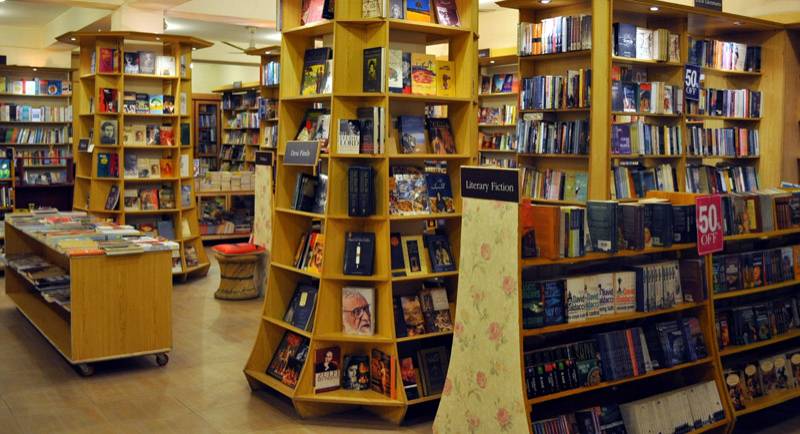
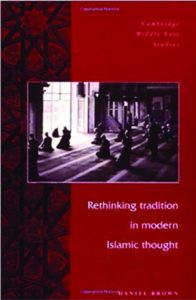
Rethinking Tradition in Modern Islamic Thought
Daniel Brown
Cambridge University Press (1999)
Rs4,680
Questions about the authenticity and authority of Sunnah have long been of central importance to the study of Islam, especially to those concerned with Islamic law. In this fascinating study, Daniel Brown traces the emergence of modern debates over Sunnah, focusing in particular on Egypt and Pakistan where these controversies have raged most fiercely, and assesses the implications of new approaches to the law on contemporary movements of Islamic revival. Using the case of modern Islam as a starting-point, the author considers how adherents of any great tradition deal with change.
Modern Muslim intellectuals have been trying to reestablish a foundation for the revival of Islamic law. Brown assesses the implications of new approaches to the law on contemporary Islamic revivalist movements, and explores the impact of modernity on attitudes toward religious authority generally. This book will make a major contribution to the understanding of contemporary Islam, and will be of interest to scholars of the Middle East and South Asia, and to those teaching Islamic law.
Daniel Brown is the author of Rethinking Tradition in Modern Islamic Thought (Cambridge) and A New Introduction to Islam (Wiley-Blackwell). He was awarded his doctorate in Islamic Studies from the University of Chicago, has taught at Mount Holyoke College and Smith College and has been a visiting scholar at the Islamic University in Islamabad, the Institute of Islamic Culture in Lahore, Cairo University and Oxford University. His interests include modern Muslim intellectual history, Hadith studies, and Muslim-Christian relations. He directs the Institute for the Study of Religion in the Middle East.
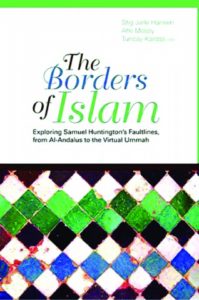
The Borders of Islam: Exploring Samuel Huntington’s Faultlines from Al-Andalus to the Virtual Ummah
Eds. Stig Jarle Hansen, Atle Mesoy, Tuncay Kardas
Columbia University Press (2009)
Rs7,801.00
In The Clash of Civilizations, Samuel Huntington argued that the borders between Western and Islamic civilizations would one day become the loci of cultural conflict. The statements of Osama Bin-Laden would seem to support this view. “This battle is not between al-Qaeda and the U.S.,” he famously said in October of 2001. “This is a battle of Muslims against the Global Crusaders.”
These specially commissioned essays critically examine the virtual and actual borders of Islamic civilization. Contributors concentrate on local dynamics and whether they support or contradict an emerging global confrontation between Islam and its Christian, Hindu, Buddhist, and secular neighbors. They consider borders that host Muslim majorities (Afghanistan, Bosnia, Chechnya, Ethiopia, Indonesia, Somalia, Pakistan, and Turkey), those that have significant Muslim minorities (Philippines, Nigeria, and India), and those that reflect new fault lines created by migration to France, the United Kingdom, the United States, and Spain or by advances in technology. Essays explore the rise of international Salafi jihadism and whether it can be traced to countries that straddle the Islamic and non-Islamic world. In conclusion, the contributors argue that mechanisms far more complex than those described in Huntington’s Clash of Civilizations influence many border regions, suggesting that, while poverty and institutional failure heighten religious awareness and practice, the actual effects of these phenomena are entirely different.
Stig Jarle Hansen is an associate professor at the University of Life Sciences in Oslo where he teaches Norway’s only MA in International Relations. He speaks Somali, Swahili and Arabic.
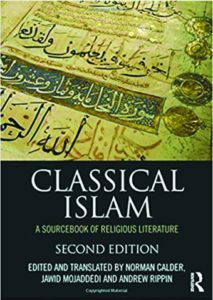
Classical Islam: A Sourcebook of Religious Literature
Eds. Norman Calder, Jawid Mojaddedi, Andrew Rippin
Routledge (2012)
Rs8,581
This definitive sourcebook presents more than sixty authoritative new translations of key Islamic texts. Edited and translated by three leading specialists, Classical Islam features eight thematically-linked sections covering the Qur’?n and its interpretation, the life of the Holy Prophet Muhammad (PBUH), the Had?th, law, theology, mysticism and Islamic history. The new edition has been expanded to cover a fuller range of material illustrating the growth of Islamic thought from its seventh-century origins through to the end of the medieval period. It includes illustrations, a glossary, extensive bibliography and explanatory prefaces for each text. Classical Islam is an essential resource for the study of early and medieval Islam and its legacy.
Norman Calder, who died in 1998, was Senior Lecturer in Arabic at the University of Manchester, UK. His Studies in Early Muslim Jurisprudence and numerous articles have had a lasting impact on the study of Islamic law.
Jawid Mojaddedi is Associate Professor of Religion at Rutgers University, USA. He received the Lois Roth Prize for translations of Rumi’s Masnavi and is author of The Biographical Tradition in Sufism (RoutledgeCurzon 2001).
Andrew Rippin is Professor of Islamic History at the University of Victoria, Canada, and a Fellow of the Royal Society of Canada. His books include Muslims: Their Religious Beliefs and Practices (4th edition, Routledge 2011).
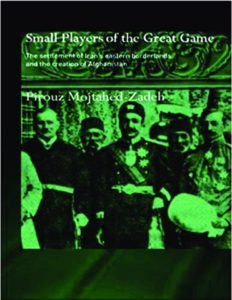
The Small Players of the Great Game: The Settlement of Iran’s Eastern Borderlands and the Creation of Afghanistan
Pirouz Mojtahed-Zadeh
Routledge (2007), Rs10,141
This book deals with the 19th century Anglo-Russian Great Game played out on the territorial chessboard of eastern and north-eastern parts of the waning Persian empire. The Great Game itself has been written about extensively, but never from a Persian angle and from the point of view of the local players in that game. Looking at the territorial consequences of the Great Game for the local players is a unique approach, which deserves a special place in the studies of history, geography, politics and geopolitics of the age of modernity. Particular attention is paid in this work to the impact of the age-old rivalries between local dynasties such as the Khozeimehs of Khorasan (of Iran) and Abdalis of Afghanistan on shaping the global structure of the Great Game itself and on the political geography of West Asia. The work presents a thorough study of the 19th century Anglo-Russian games of geopolitics that have shaped today’s political geography of West Asia and the evolution of the international boundaries between Iran, Afghanistan, Pakistan, and Central Asian republics. For the first time, this study reveal how, through the agency of Britain and Russia, the state of Afghanistan and the Russian provinces of Central Asia were created out of the north-eastern provinces of the waning Persian Empire.
Pirous Mojtahed-Zadeh is Professor of Geopolitics at Tehran University, and Chairman of Urosevic Foundation in London. For 35 years, he has been doing research in and teaching the political geography and history of Iran and West Asia, the Persian Gulf and the Caspian Sea. He lectures extensively in North America, West Europe, the Middle East and the Far East.
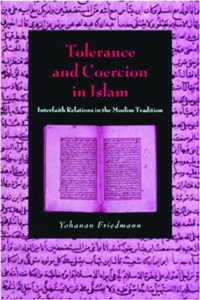
Tolerance and Coercion in Islam: Interfaith Relations in the Muslim Tradition
Yohanan Friedmann
Cambridge University Press (2003)
Rs 5,461
What does Islam say about non-Muslims? The vast literature on this subject tends to wobble unsteadily on a narrow base of evidence—namely the Holy Qur’an itself. Or as Friedman, professor of Islamic studies at the Hebrew University of Jerusalem, delicately puts it, “some of the more substantial works on our topic are based exclusively on the few relevant Qur’anic verses and, surprisingly enough, have no recourse to the enormous amount of material in Hadith, tafsir, and fiqh.” The preference to focus on the Holy Qur’an rather than the million or so Hadiths (sayings and actions attributed to the Holy Prophet Muhammad (PBUH)) is certainly understandable, but for a true understanding of Muslim jurisprudence and ethos, the latter needs to be taken into account.
In a tour de force, Friedman reviews the Hadith literature on a series of topics concerning pre-modern Muslim attitudes toward non-Muslims, including equality before the law, religious compulsion, apostasy, and interfaith marriages. The power of his analysis lies in the distinctions he finds between eras and madhhabs (schools of law). For example, he shows that whereas Muslims early on granted non-Muslims equal protection from murder, with time, only one of the four Sunni madhhabs held to this position. More broadly, he argues that this development over time signifies that “the idea of Islamic exaltedness gained the upper hand as the decisive factor in the determination of the law.”
This theme of Islamic supremicism has key importance; in the words of one Hadith, “Islam is exalted and nothing is exalted above it.” With the most minor of exceptions, Friedman observes, Muslims throughout the pre-modern period “faced the other religions from the position of a ruling power, and enjoyed in relation to them a position of unmistakable superiority.” To a great extent, this also defined their attitudes toward tolerance and coercion.
Yohanan Friedmann was member at the Institute for Advanced Study in Princeton in 2002. In 2003 he received the Landau Prize in the Humanities. Prof. Friedmann continues to teach on a volunteer basis in the Department of Arabic Language and Literature and the Department of Near Eastern Studies. Friedmann’s studies center on Islamic religious thought, mainly in the Indian subcontinent. He assays the historical record for evidence of both tolerance and intolerance of other religious faiths in the Islamic tradition in his most recent work, “Tolerance and Coercion in Islam: Interfaith Relations in the Muslim Tradition”.

